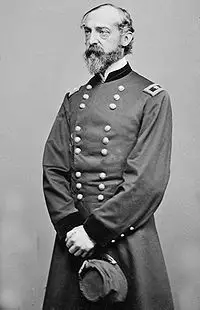 |
Major General George Meade was a Union general most associated with his victory at the Battle of Gettysburg in July 1863. George Meade was a career army officer who possibly did not receive the credit he deserved from Abraham Lincoln for the victory at Gettysburg.
George Meade was born on December 31st 1815. He spent a great deal of his early years in Spain where his father worked as a merchant. Meade’s father also worked as a naval agent for the US government. When he was aged 13 the whole family returned to America after their father had lost his fortune and died. Meade joined West Point Military Academy in 1831 and after graduating joined the 3rd US Artillery. However, he resigned his commission in 1836 after he decided that a military career was not for him. He became a civil engineer but found consistent employment very difficult to get. To stabilise his precarious financial situation, Meade rejoined the army in 1842 and worked as an army engineer. He fought in the Mexican-American War and in 1856 was promoted to captain. Meade was working on a survey of the Great Lakes when the American Civil War broke out.
Shortly after the outbreak of war, Meade was promoted to Brigadier General. He was put in charge of the 2ndBrigade of Pennsylvania Reserves, which took part in the construction of defences around Washington DC. Meade joined McClellan’s Army of the Potomac for its advance south. At the Battle of Glendale, he was seriously wounded but recovered in time for the 2nd Battle of Bull Run. Here he gained fame for his leadership at Henry House Hill where he successfully defended the rear of the Army of the Potomac while it retreated.
By the Battle of Antietam, Meade was in charge of the 3rd Division, I Corps in the Army of the Potomac. His men fought so well at this battle that Meade was appointed commander of I Corps, succeeding the wounded Major General Joseph Hooker.
Meade’s men fought equally as well at the Battle of Frederiscksburg and after this he was promoted to Major General and given charge of V Corps. Meade commanded V Corps at the Battle of Chancellorsville in 1863 where he remonstrated with the commander of the Army of the Potomac, General Hooker, for being too wary in his approach to the battle. Much of V Corps was kept in reserve during this battle. Military historians have argued that the outcome – a victory for the South – could have been different if Meade’s V Corps had been used in an offensive capacity.
On June 28th 1863, Lincoln appointed Meade to succeed Hooker as commander of the Army of the Potomac. Just two days later the Battle of Gettysburg started. It was to be a defining battle for the Meade and his adversary, Robert E Lee. Having criticised Hooker at Chancellorsville for being too wary and cautious, Meade decided that his best approach at Gettysburg was to be defensive and use the geography around Gettysburg to his advantage. The first day of the battle did not go well for Meade as only part of his army had reached Gettysburg. His men commanded by John Buford were forced to withdraw to the heights to the south of Gettysburg. By July 2nd both armies had fully gathered at Gettysburg. Meade decided to let Lee force the issue. He remained in his defensive positions around Culps Hill, Cemetery Hill and Cemetery Ridge, all to the south of Gettysburg. Buoyed with confidence after Chancellorsville, Lee ordered his men to attack. The second day at Gettysburg saw neither side particularly successful. On July 3rd, Lee ordered a disastrous attack against Cemetery Ridge. Meade’s men stood firm. 12,500 Confederate troops rushed Union positions atop the ridge. Over 50% never returned to their lines. It was a disastrous assault and Lee had no option but to retreat. For Meade, the Battle of Gettysburg should have been a career defining moment.
However, the Commander-in-Chief, Lincoln, criticised Meade for not following up Lee’s retreat with any energy. Other politicians in Washington followed the President’s path but he did receive the ‘Thanks of Congress’ and promotion to Brigadier General.
In March 1864, General Ulysses Grant was appointed commander of all Union armies. Meade believed that this would lead to him clashing with Grant over how the Army of the Potomac should be used. He offered Grant his resignation but Grant refused to accept it. For the rest of the American Civil War, Meade worked at Grant’s headquarters. They had an uneasy relationship though Grant did write that Meade (and Sherman) were “the fittest officers for large commands I have come in contact with.”
Meade did not agree with Grant’s war of attrition against Lee and was not supportive of a campaign that led to so many casualties. Meade’s brusque manner also brought him into conflict with the press who had access to Grant’s headquarters. Meade made himself so unpopular with the press that they reported Union successes in terms of them being the result of Grant’s leadership whereas losses were reported in terms of Meade’s lack of ability. This relationship Meade had with the press was mirrored by his relationship with the soldier in the field. While they respected his tactical ability, his temper led to him getting the nickname of ‘snapping turtle’.
By the end of the American Civil War, Meade had been promoted to Major General and only three other men outranked him in the Union army.
After the American Civil War, Meade held a variety of military posts.
George Meade died on November 6th 1872 aged 56.
